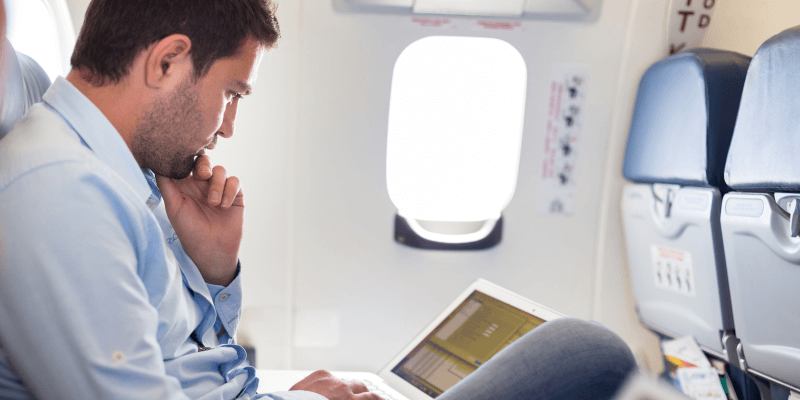
21 Lessons from a Seasoned Digital Nomad
A “digital nomad” is an individual who uses telecommunications technologies to earn a living and generally conducts life in a nomadic manner. If you’re already familiar with this term, you’re not alone.
Web searches for “digital nomad” have increased by 900 percent in the last 4 years. And as companies become more flexible and millennials enter the job market, the interest in working for startups and as freelancers is expected to grow.
If you’ve ever considered becoming a digital nomad yourself, here are 20 lessons learned (plus one bonus item!) from combining remote work and long-term travel:
1. Join digital nomad communities.
There are multiple communities where you can learn more about the nomad lifestyle and begin your journey.
These include traveling communities, online forums, offline retreats, educational conferences, cruises, and more.
Each can help you enjoy the nomadic lifestyle by offering valuable information for travel and work and helping you make friends even before you arrive to a new destination.
2. Understand that travel doesn’t mean it’s a vacation.
I can assure you that being a digital nomad isn’t a nonstop vacation. I’m working. I’m putting in my “40 hours per week” and being an entrepreneur, and I often work more than 40 hours.
Of course, you can combine a vacation and remote work, but as a digital nomad, you’ll learn that traveling doesn’t equal vacation.
However, while at remote working locations, I do take advantage of where I’m based to experience nearby exotic destinations and do cool stuff in the area.
While in a new locale, I have the “pressure” that I’m leaving after a short period of time and won’t have the chance to do these things again.
3. Find productive work while traveling.
Digital nomads quickly learn how to get “in the zone,” focus without distractions, and be productive on the road.
Anyplace can be your office: a train, a coffee table, a bench. You’ll become results-oriented as you’re “results-managed.”
To maximize your efficiency, learn when, where, and how to be at the high end of your productivity cycle each day.
4. Find your purpose.
Purpose is defined as doing something you love and if the world needs it, you’re good at it, and it pays well.
In addition to those ideals a digital nomad’s purpose includes “you can do it remotely,” making working in one specific place optional.
However, truth be told, you can be in the most beautiful place on earth, working on your laptop on a project that covers all of the above, but if you’re detached from the end result, will you be fulfilled?
If what makes you happy is helping people and you don’t get to see these people, I doubt your fulfillment will be the same. So do something locally to fill that void. That’s what I’ve been doing and it works like a charm.
I love working remotely on Terminal 3, and I love traveling thanks to my job, but I’ve discovered that interacting with the local startup ecosystem and working within it helps me connect with others and fulfills me more than if I were working from a beach in a remote location.
5. Find your happy.
Many people I’ve talked to want to join this lifestyle to become happier. It helps, but maybe the pursuit of happiness is the happiness of pursuit.
Because we’re not all the same, you’ll need to find YOUR way of being happy.
Find the elements that make you happy, try to find them wherever you are, and you’ll achieve happiness.
6. Understand there’s no “reality” anymore.
We now can change jobs as fast as we travel, work on two or three projects, and live anywhere in the world.
A working traveler’s reality can change in just a few hours by moving to a new place, finding new opportunities and new friends or relationships, and experiencing new dynamics.
As a digital nomad, the only constant is change itself. You’ll learn to embrace this and grow through it.
Once you’re back home after a long period of traveling, there’s a good chance you may feel detached, changed, and that you don’t really fit in because your friends have stayed the same. Your reality of home may now be on the road, and you’ll be stronger as a result.
7. Learn to attach to situations not to people or places.
This has been my way of keeping my sanity. I’ve moved about 18 times in the last four years due to military obligations, studies, internships, projects, work, and of course, fun.
I have spent moments of absolute happiness that I didn’t want to let go of, though I had to. I can’t be with the same person or go back to that same place, BUT what I can do is try to recreate a similar situation.
Gather a group of friends and have a Sunday morning brunch or take a few people and spend the weekend road tripping.
Maybe they’re not the best friends in the world, but I do connect with them in some way and I get to know them better. With some, I’ll keep in contact and reconnect after years, and others will become “location friends” just because it’s convenient to hang out. All are meaningful.
8. Go easy on yourself.
In our current world of work and style of living, we tend to have a set ideal of what “doing well” means.
But keep in mind that when you travel, any experience can be a good experience (even getting mugged in Brazil, like me). Don’t get stuck with preconceived ideas of what lies ahead.
Traveling for a weekend alone can be a weekend of solitude that allows you to take time to think and work. Or it can be a weekend full of engaging with new people, making friends, and going out. The same city can offer a variety of experiences.
This mindset also applies to your career. Your focus can change from wanting to be CEO of a multinational corporation to being a small business owner in Thailand; more importantly, they both can come with a view of the beach.
9. Save money.
You’ll probably spend less money traveling and working than you would if you stayed home. You can do so for less than $1,000 a month.
You can give up your permanent address or you can even rent your apartment through Airbnb and make a small income.
There’s no need for a car either—gas and commute traffic will probably be just a memory.
Also, you might have tax benefits, because U.S. citizens working abroad (spending less than 35 full days in a year in the U.S.) can save thousands of dollars.
10. Invest in experiences not things.
I understand that you may think getting the latest flagship phone from your favorite tech company is a need. But based on my experience, you’ll remember more of your scuba-diving expedition, an amazing weekend with friends, and so many more things you can do for that same cost.
Science backs me up as you focus on acquiring experiences, which create long-lasting memories, rather than things.
11. Be open to new experiences.
When was the last time you Googled “cool stuff to do in <own city>”? Stepping out of your comfort zone will become your comfort zone. You’ll want to try new things and experience life at its best.
12. Learn to travel!
From understanding situations and reading people better to realizing it’s not that hard to pack your bags and head to your next adventure, you’ll pick up all the small tricks to travel successfully.
Planning doesn’t need to be a big part of your trip. Grab a cheap flight, go somewhere, and don’t return until you’re out of money or have satisfied your urge to travel.
As long as you keep making an income, you can survive on very few dollars per day. You can do it alone, anytime of the year, and go to most places in the world.
I have friends who have travelled to the most remote parts of the world on their own from age 16 with no income, couch surfing, and they didn’t have any (really) bad experiences.
13. Learn new languages.
Spending longer than a few days in a new country will allow you to pick up a language, which will help you connect more easily with the people around you and will open doors to more experiences.
Find a meetup group and connect with the locals to help you learn the language. This strategy can also help you advance your career and make you more valuable to an employer.
14. Absorb the culture.
Being open to learning the culture of the people in your new location and looking deeper than the average tourist will make you more welcomed.
Here’s how:
- Read about the customs beforehand, ask locals about festivities, and try to join them whenever you can.
- Absorb elements of cultures that will (re)form you in ways you never expected.
- Ask a local nonprofit organization to get ideas. Impact HUB can be a good place to start.
15. Find networking opportunities.
Did you know some of the most successful professionals are working remotely? Freelance developers, designers, and startups are just a few opportunities that offer travel to exotic locations; you’ll be amazed at the connections you can make.
Where do you think the thousands of people working for these 125 fully remote companies are based?
16. Embrace personal development.
Understand yourself better than ever before by pushing yourself out of your comfort zone and going to a new place. You’ll identify the patterns of how to work better and how you can live better through exploration.
17. Make new friends all over the world.
People are nice; I think 99.99 percent of them are. We tend to think they might have an ulterior motive or want to profit from us, but many times they’re just like us.
You’re going to make hundreds of new acquaintances and many new friends, some of which you’ll keep for years, and maybe you’ll join them on a trip or be invited to their wedding. This offers the extra advantage of having a local connection in these countries.
18. Become a better communicator.
What? Yes, better. No more useless meetings, just meetings with a strict agenda and quicker execution. That excludes small talk, gossip, and office politics.
You’ll still be able to ask about the important things from the people you honestly like at the office.
Also, with so many online tools for remote workers, such as Slack’s funny integrations, you can have fun doing it.
19. Learn how to pack.
You think you need 30 kilograms or more of stuff or 20 kilograms at the minimum, maybe?
Get an idea of what you should pack when living a nomadic life. Pack lightly, especially when you’re going to warm or tropical places with inexpensive clothing. You can dress like a local to fit in.
20. Realize there’s bad and there’s ugly traveling.
Visas denied, passports lost, getting sunburned, motorbike accidents, getting mugged, and feeling lonely can create some ugly travel experiences.
For me, though, it’s all part of the experience.
Why are ugly traveling experiences a benefit? These experiences will allow you to understand and connect with other travelers more easily, and these setbacks can help you better comprehend other areas of your life and career as well.
Here are a few things to know before you leave for a long trip.
21. Make your boss happier!
Being a digital nomad allows for:
- Less direct and indirect costs for the company
- Increased productivity
- Increased efficiency
- Higher loyalty
- Higher engagement
- Less management time for your boss and less micromanagement for you
- Less impact on the environment
- Once all employees go remote, the boss should be able to start traveling as well
- Multiple time zones equal higher flexibility during productive hours, which is important for international customer service and communications
Can’t convince the boss? Get some ideas on how to negotiate a remote work arrangement. Show your boss the lessons learned from companies who have gone remote, how working from home raises productivity according to the Harvard Business Review, and the reasons why companies should let employees telecommute.
Start with a trial period, take one day working from home every week, then one week per month, then one month per quarter.
If everything goes well, you should be able to persuade the boss. Once you’ve proven the case for working remotely and your results are proven, the whole world can be your office as a digital nomad.
Ioannis Papoutsis is cofounder of Terminal 3, a group travel service for remote working professionals, gathering a community of digital nomads and traveling with up to 30 people to six countries, staying one month in each. He also works with organizations locally to help entrepreneurs and social causes.
By Ioannis Papoutsis | Categories: Work Remotely



